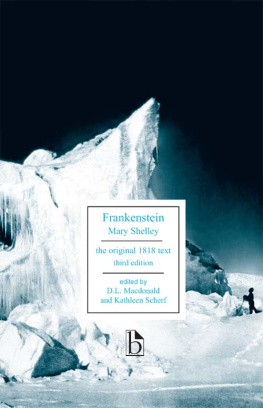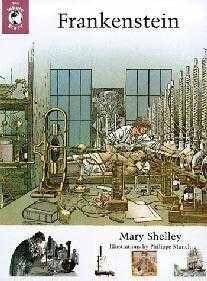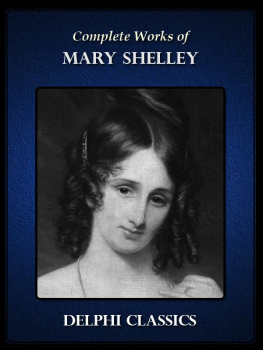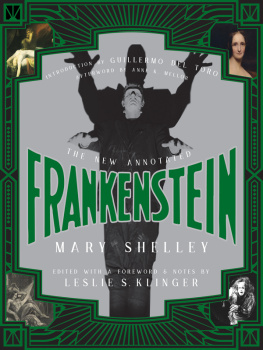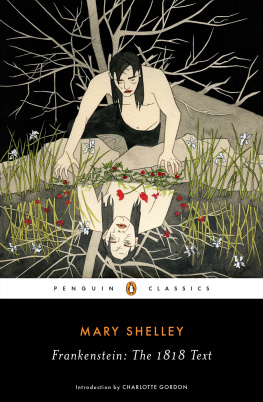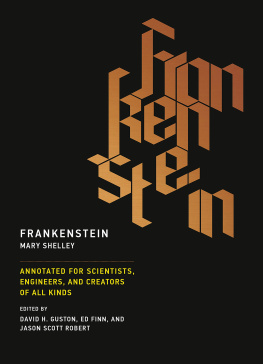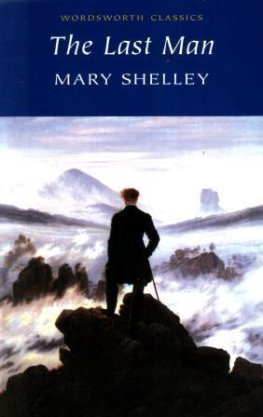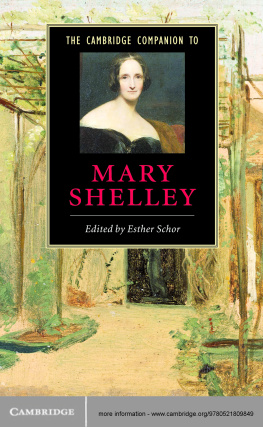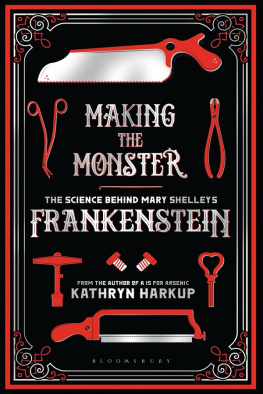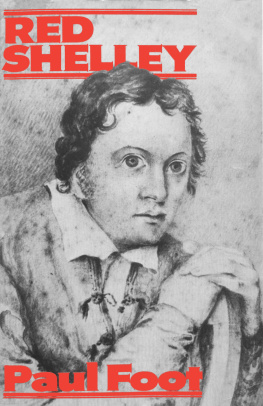FRANKENSTEIN;
OR, THE MODERN PROMETHEUS
Mary Wollstonecraft Shelley
the original 1818 text
third edition
edited by D. L. Macdonald and Kathleen Scherf

2012 D.L. Macdonald and Kathleen Scherf
All rights reserved. The use of any part of this publication reproduced, transmitted in any form or by any means, electronic, mechanical, photocopying, recording, or otherwise, or stored in a retrieval system, without prior written consent of the publisheror in the case of photocopying, a licence from Access Copyright (Canadian Copyright Licensing Agency), One Yonge Street, Suite 1900, Toronto, Ontario M5E 1E5is an infringement of the copyright law.
Library and Archives Canada Cataloguing in Publication
Shelley, Mary Wollstonecraft, 1797-1851
Frankenstein, or, The modern Prometheus / Mary Wollstonecraft
Shelley ; edited by D.L. Macdonald and Kathleen Scherf.3rd ed.
(Broadview editions)
The original 1818 text. Includes bibliographical references.
ISBN 978-1-55481-103-8
I. Scherf, Kathleen, 1960- II. Macdonald, D. L. (David Lorne), 1955-2010
III. Title. IV. Series: Broadview editions
PR5397.F7 2012 823.7 C2012-903323-5
Broadview Editions
The Broadview Editions series represents the ever-changing canon of literature in English by bringing together texts long regarded as classics with valuable lesser-known works.
Broadview Press is an independent, international publishing house, incorporated in 1985.
We welcome comments and suggestions regarding any aspect of our publicationsplease feel free to contact us at the addresses below or at .
North America
Post Office Box 1243, Peterborough, Ontario, Canada K9J 7H5
2215 Kenmore Avenue, Buffalo, NY, USA 14207
Tel: (705) 743-8990; Fax: (705) 743-8353
email:
UK, Europe, Central Asia, Middle East, Africa, India, and Southeast Asia
Eurospan Group, 3 Henrietta St., London WC2E 8LU, United Kingdom
Tel: 44 (0) 1767 604972; Fax: 44 (0) 1767 601640
email:
Australia and New Zealand
NewSouth Books
c/o TL Distribution, 15-23 Helles Ave., Moorebank, NSW, Australia 2170
Tel: (02) 8778 9999; Fax: (02) 8778 9944
email:
www.broadviewpress.com
Broadview Press acknowledges the financial support of the Government of Canada through the Canada Book Fund for our publishing activities.

This book is printed on paper containing 100% postconsumer fibre.
Typesetting and assembly: True to Type Inc.,
Claremont, Canada.
PRINTED IN CANADA
In Memoriam
I AN F AIRCLOUGH
(1951-1995) and
D AVID L ORNE M ACDONALD
(1955-2010)
Preface
The hunt for sources for Frankenstein, as Maurice Hindle has remarked, has become something of a sport (xxxv). One might add that the hunters have bagged some big game. An edition like this one, which tries to give a sense of the whole intertextual network within which Mary Shelleys novel was written and received, must be rigorously selective. In choosing excerpts for our Appendices, therefore, we confined ourselves to those authors who demonstrably shaped Shelleys thinking on politics (Godwin and Wollstonecraft) and science (Darwin and Davy) and to those whom her monster mentions as having shaped his own thinking (Volney, Goethe, Plutarch, and Milton). As well, in order to provide a comprehensive picture of the atmosphere that inspired Frankenstein we have included two other ghost stories written at the Villa Diodati in the summer of 1816: Lord Byrons A Fragment, and John Polidoris adaptation of the fragment, which he called The Vampyre. Since he starts out as a sort of noble savage, it is interesting, Anne McWhir argues, that Shelley does not allow him to read Rousseau (75), but such interests cannot be pursued within the limits of this edition.
Readers may be surprised not to find Shelleys husband more extensively represented in our Appendices. There are two reasons for this omission. First, Frankenstein has been extensively studied as a response to the character and works of Percy Shelley, notably in books by Christopher Small and William Veeder. Second, Percys work does not lend itself well to excerption. Shelleys novel certainly responds to his Alastor (1815), but it responds to it as a whole, and we can only urge our readers to read the whole, which is readily available. (Moreover, Percy was an enthusiastic disciple of Godwin and Wollstonecraft, so that much of what Frankenstein responds to in him came from them in the first place.)
Similar principles guided our treatment of the authors we were able to include. A great deal has been said about Shelleys use of Milton but very little about her use of Plutarch; accordingly, we have been more generous in our excerpts from the latter. Our notes, of course, identify all Shelleys overt allusions to other authors, whether or not they are represented in our Appendices.
Roberta Jackson was of great help at every stage in the preparation of the text and of Appendix H, from the initial collation to the final proofreading. We are also grateful for the generous assistance of Bill Blackburn, Roswitha Burwick, Gordon Fulton, Bruce Harper, Stephanie Kepros, David Ketterer, Jack Kolb, Anne McWhir, David Oakleaf, Charles E. Robinson, Vivienne Rundle, Lisa Storozynsky, and Jnis Svilpis.
We are grateful to Doubleday and Company, for permission to quote from The Complete Poetry of John Milton, ed. John T. Shaw-cross (rev. ed. 1971); to Ohio University Press, for permission to quote from Seven Gothic Dramas, ed. Jeffrey N. Cox (1992); and to Oxford University Press, for permission to quote from the 1831 version of Frankenstein; or, The Modern Prometheus, by Mary Wollstonecraft Shelley, ed. M.K. Joseph (1980).
Note to the Second Edition: For this edition, we have expanded our annotations to show how Shelley responded to her parents fiction as well as to their political writings, and to outline the chronology of her novel. We have added appendices including lessons by Wollstonecraft, which may have suggested the monsters education (C.5), and P.B. Shelleys review (D.4). The work of Nora Crook, David Ketterer, E.B. Murray, and Charles E. Robinson has enabled us to improve our account of the evolution of the novel, both in the Introduction and in Appendix H. In Appendix H, we have indicated which revisions were made by Shelley in the copy of the novel that she gave to her friend Mrs. Thomas in 1823, which were made (probably by Godwin) in the second edition (1823), and which were made by Shelley in the third edition (1831). We are grateful to the Pierpont Morgan Library, New York, for permission to quote manuscript material from the Thomas copy of Frankenstein (PML 16799).
Note to the Third Edition: It has been almost two decades since the publication of the first edition of Broadviews Frankenstein: The Original 1818 Text

